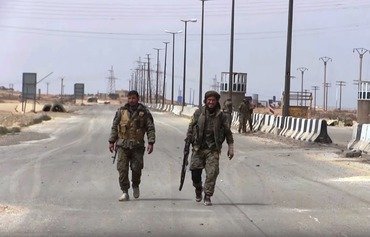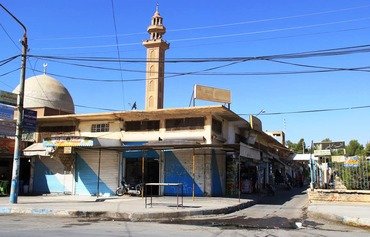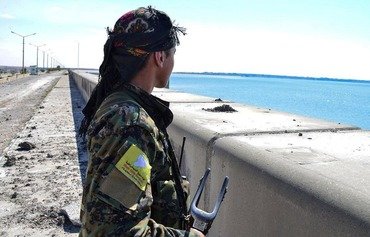Inside the Syrian city of al-Raqa, residents tell Diyaruna they are living in tense anticipation as the Syrian Democratic Forces (SDF) draw closer.
The Arab-Kurd alliance has liberated much of rural al-Raqa from the "Islamic State of Iraq and the Levant" (ISIL) and has fought to gain control over the main roads leading to al-Raqa, SDF fighters said.
ISIL has barred people from entering or leaving the city, which is suffering from an acute shortage of food, especially flour, sparking a steep increase in the price of bread.
"The group’s elements have gone unhinged of late, as is clearly evident from their daily actions against civilians in the city of al-Raqa," said al-Raqa shop worker Hamad al-Matar, using a pseudonym out of fear for his safety.
These include barring people from leaving the city regardless of circumstances, reasons or excuses, he told Diyaruna, noting that these restrictions peaked when rumours of the possible collapse of al-Tabqa dam began to spread.
"Rural residents, most of whom had fled combat zones but could not escape from ISIL-controlled areas, also were barred from taking refuge in the city, and were forced to spend their nights in agricultural areas and fields," he said.
"Most of them sleep in tents, which cost at least $500 apiece because they are scarce," al-Matar added.
ISIL's checkpoints have been clamping down on civilians and ISIL elements alike, he said, detaining anyone who tries to leave without a permit.
Difficult conditions in the city
"Conditions in the city are very difficult," al-Matar said. "Water has been cut off from the city since March 25th, and bread is extremely scarce because of the unavailability of flour."
ISIL has seized all boats and ferries on the Euphrates River to prevent them from being used for escape, he said.
"It also confiscated all fishing boats, depriving fishermen of their meager daily income that helped them cope with the conditions," he added.
The group has begun to control transportation activity, increasing the fees to 1,500 Syrian pounds ($7) for goods and 500 pounds ($2) for individuals, he said.
ISIL patrols are conducting round-the-clock raids on homes to search for radio communication equipment, cell phones with external lines, internet equipment and laptop computers, and to check identification papers, al-Matar said.
Despite reports that it has emptied its jails, ISIL is still detaining civilians on flimsy pretexts, such as dealing with coalition forces or smoking, he said.
Cutting off vital arteries
"The ongoing battles in rural al-Raqa, as part of the third phase of the Wrath of the Euphrates operation, have achieved great gains in the recent period," SDF commander Mahmoud Ismail told Diyaruna.
These include the capture of vast areas in northern rural al-Raqa and advances in rural al-Tabqa, he said, listing prominent achievements such as the liberation of al-Tabqa airport and seizure of most of al-Tabqa dam.
"This will pave the way for the complete liberation of the city of al-Tabqa in the near future," he said, and for cutting off the al-Tabqa–Damascus road.
"The ongoing operations and their outcomes set the stage for an assault on the city of al-Raqa, the group’s main stronghold," he said.
Recent operations in rural al-Tabqa and al-Raqa saw "violent direct clashes with the group’s elements and were conducted with extreme caution for the most part due to the fact that ISIL is using civilians as human shields", Ismail said.
"So efforts are focused on opening safe passages for civilians to leave their villages and towns before they are stormed to avoid harming them," he said.
Solidarity among civilians
Even though they are in a wretched state, civilians who flee ISIL-controlled areas and reach the liberated areas say they want nothing more than to be free of the group, said Ocalan Sheikhi, a relief worker at the Turkish-Syrian border.
"There is great solidarity and mutual assistance among the civilians, who share the food and water among themselves," he told Diyaruna.
Most of those who flee eventually return to their homes, when their villages and towns are liberated from ISIL, secured, and cleared of mines, he said.
Residents of al-Raqa city and surrounding areas who have fled have been provided with accommodation in the liberated areas soon after their escape, Sheikhi said, with a large number residing in camps set up near the Turkish border.
Currently, there is almost no one arriving from al-Raqa city due to ISIL's blockade, which has made leaving the city almost impossible, he said.

![A Syrian Democratic Forces tank rolls through the upper eastern section of al-Raqa province. [Photo courtesy of SDF]](/cnmi_di/images/2017/04/13/7579-Syria-Raqa-SDF-600_384.jpg)






